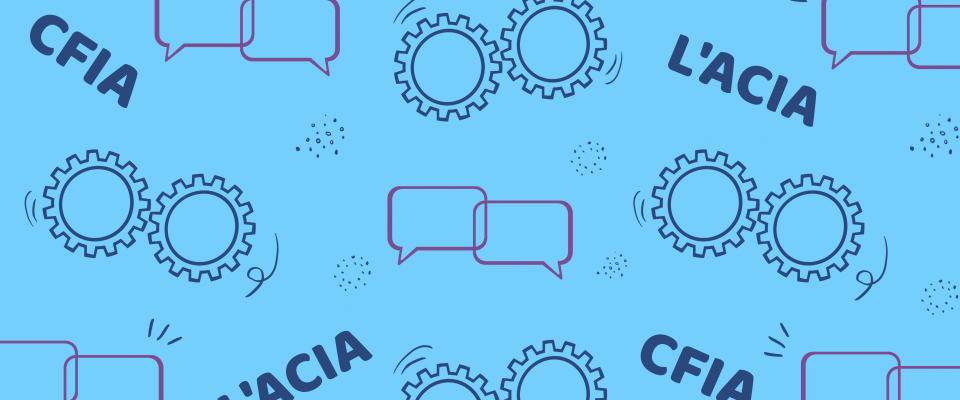PSAC members at the Canadian Food Inspection Agency (CFIA) participated in a virtual national bargaining conference June 8–10 to prioritize bargaining issues and elect their bargaining team. The current collective agreement expires in December, and a new round of talks kicks off later this year.
We know the pandemic has had a profound impact on the way we live and work, exposed glaring inequalities for marginalized workers and raised other major issues that we need to address through collective bargaining with CFIA.
Over the last few months, we’ve asked members at CFIA to tell us how the pandemic has impacted them and to put forward proposals to help reshape work at the agency in the wake of COVID-19. This input was discussed and prioritized at the bargaining conference.
Meet the 2021 CFIA Bargaining Team
British Columbia: Terri D’Souza
British Columbia: Todd Smith
Alberta: Randy Olnyk
Saskatchewan: Michelle Schultz
Manitoba: Andrew Neufeld
Ontario: Sandra Sheppard
NCR: Sylvie Jubinville
Quebec: Sylvia Venne
Atlantic: Jan Pennington
Negotiator: Hassan Husseini
Researcher: Silja Freitag
Key bargaining issues
Work-life balance
With the shift to remote work, we have to secure the right for members to disconnect from electronic work devices outside of working hours and expand leave provisions (e.g. 699 leave, leave for family-related responsibilities, sick leave) to improve work-life balance, which is especially critical for women, caregivers and those with disabilities. We also need to negotiate flexible work options that allow members to shape their workdays to match their personal and family responsibilities.
Fair wages and allowances
To continue attracting strong candidates to public service jobs, we have to negotiate compensation in line with that of workers in similar occupations in the industry. We also must secure wage increases that reflect the rising cost of living, and our members’ hard work and dedication.
Job security
The current period of economic uncertainty emphasizes the need for a fairer Employment Transition Policy (ETP) in case of layoffs. The current employment transition policy process unnecessarily threatens employees with potential displacement and forces workers to re-interview for their own jobs, causing stress and other adverse mental health impacts. We must oppose all forms of precarious employment and ensure that all members have timely access to indeterminate employment.
Mental health support
The pandemic has reaffirmed the need for robust mental health supports as members have struggled to balance work and family care, while dealing with ongoing anxiety about COVID-19 exposure. Moreover, many CFIA employees did not have the option of working from home — instead continuing to work in labs, processing plants and slaughterhouses to ensure food for Canadians remained safe, which further impacted members’ mental health.
We must build on the memorandum of understanding with respect to workplace mental health negotiated in the last round of talks and ensure a strong mental health strategy at CFIA.
Systemic racism
Systemic racism continues to prevent the public service from reaching its full potential. We must actively address the barriers and discrimination faced by Black, racialized and Indigenous workers, and ensure that employers reject systemic racism and actively work to dismantle the structures that sustain it.
We also plan to call on the federal government to provide education to all public service workers on the history of Indigenous peoples, including the history and legacy of residential schools, the United Nations Declaration on the Rights of Indigenous Peoples, treaties and Indigenous rights, Indigenous law, and Indigenous–Crown relations.
Remote work
Provisions governing remote work will be most effective when they are negotiated into collective agreements. We must also ensure that remote work is free from remote surveillance and unreasonable performance expectations, that employers cover associated expenses, and that concerns relating to accommodations, ergonomics, and health and safety are addressed.
Safe workplaces
PSAC members at CFIA risked exposure as they continued showing up to work in food processing facilities across the country during the pandemic. Some of these became sites of major COVID-19 outbreaks. Health and safety practices learned from this experience must be formalized in the collective agreement.
Moreover, we must ensure that CFIA workplaces remain free of harassment.
Next steps
The bargaining team will meet to further review and prioritize issues for talks with the employer, and a final package of bargaining demands will be exchanged with CFIA at the first bargaining session, which hasn't been determined yet. Members will be able to access both the union’s and employer’s proposal packages on PSAC’s website.
Please be sure to keep your contact information up to date via the member portal to receive all the latest CFIA bargaining updates.
 Member Login
Member Login



